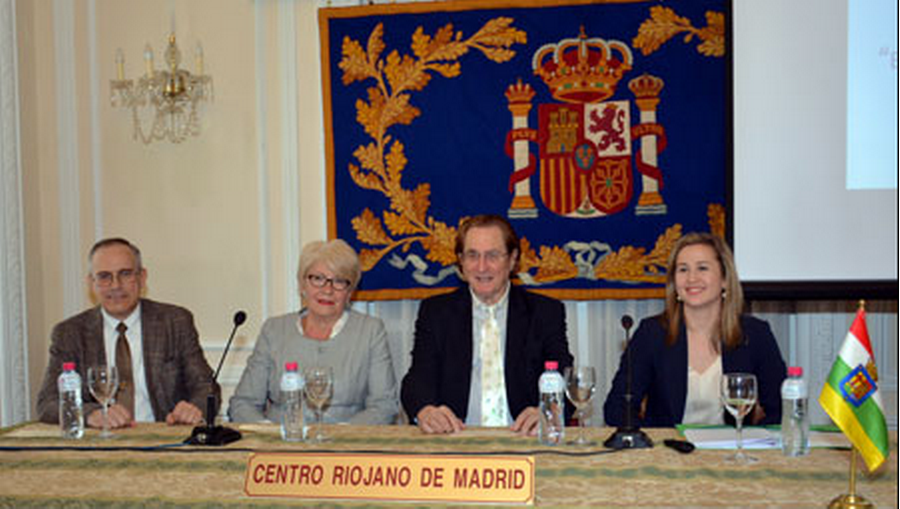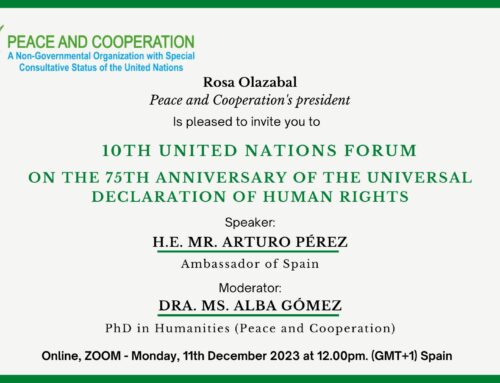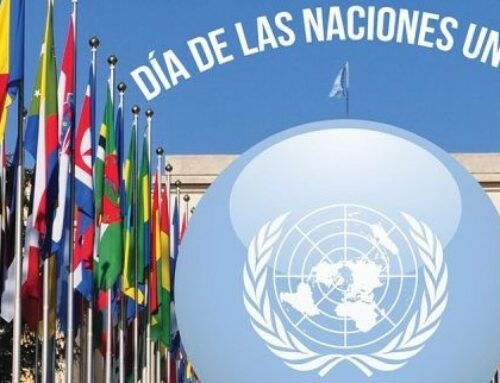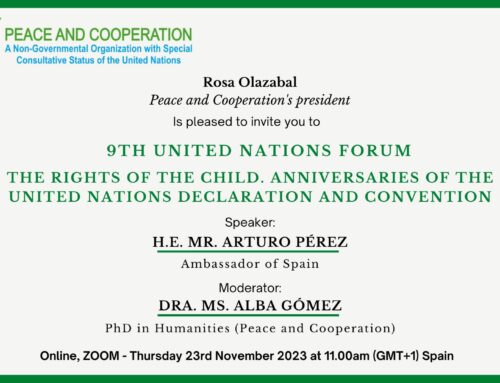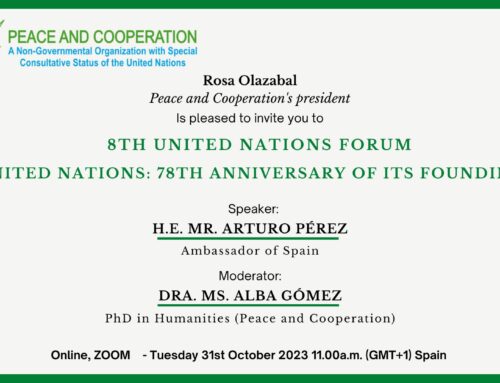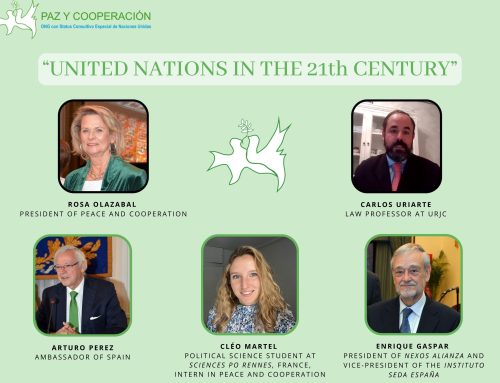On April 30th, the Centro Riojano of Madrid held a conference on the topic: “The Russian View on the current geopolitical context: the Relations between Russia and Spain”, led by the Second Secretary of the Russian Embassy, Nadia Dementieva. This is a popular current topic and very much relevant, taking into account the recent developments on the international scene, such as the United States’ exit from the INF Treaty (Intermediate-Range Nuclear Forces Treaty).
This conference is a part of a cycle of conferences from the United Nations forum, organized jointly by the Peace and Cooperation foundation and the Centro Riojano of Madrid. Their next conference will take place on May 20th with the Ambassador of Japan and the presence of the Spanish Ambassador, Arturo Pérez Martínez, who lives in Japan and is the first Spanish diplomat to be married to a Japanese woman. The conference will address the subject of “Tokyo 2020”.
The conference began with Gloria Martínez, a member of the Executive Committee of the Centro Riojano and is set to replace the current President José Antonio Rupérez, who presided over the event with Joaquín Antuña, president and founder of Peace and Cooperation. In addition, Mr. Pedro López Arriba, the former president of the Centro Riojano, and the magistrate Nadia Dementieva accompanied Martínez and Antuña at the head table. Dementieva would go on to impart the conference with a Russian view of the current geopolitical context. The former Ambassador Ibáñez, from Spain, described Dementieva as a brilliant diplomat and a great professional.
Mr. Pedro López, commented that the topic was suggestive, since the relations between Russia and Spain have been fairly pleasant throughout the years, although there have been some unpleasant times. However, the two countries have had a positive relationship for quite some time. It was in 1812, when the King of Spain signed a Peace and Cooperation Treaty with the Russian Emperor, with the intention to hinder the advancements of Napoleon. This date coincides with the creation of the Cadiz Constitution that was accepted by the Czar of Russia. Although the two countries have had a benevolent relationship, these feelings of benevolency began to change as the relations became tense and the two countries began to display clear opposition towards each other during the 1940s, 50s, 60s, with the dictator General Francisco Franco in Spain and the communism of the Soviet Union. To finalize his contribution to the forum, López gave thanks to the Second Secretary for coming to explain a situation not well known in the west, where there are few chances to tell it well.
For his part, Joaquín Antuña commented on the professionalism of Nadia Dementieva, and recalled the recent event with the Ambassador of Russia Yuri Korchagin at the Palace Hotel, and stated that, “Russia is a young democracy, and has had a past lacking freedom both in the czarist period and in the failed attempt to preach equality, but now has a democracy with both elections and oppositions, it is now a democratic country”. Above all, he added the importance that Russia has and the role that it plays in the geopolitical world. He ends with passing it over to Nadia Dementieva, adding that “this is your house”, and the importance of Russia in the global becoming.
Nadia Dementieva started with reminding us that the current world is a globalized world, and for us, it’s important to pay attention to international news, the geopolitical context and in order to form one’s own opinion, we must know and take into account different visions. Without doubt, the changes in the current world are fast and turbulent, and the new world order continues to become more multipolar. She added, “Let’s hope that it becomes more and more democratic”. Yet there are still actors who do not adapt to these changes and prefer to stay in a Cold War climate, and seeing the world as bipolar.
From this position, Nadia brought us to the subject of Russia and its circumstances, as it is the largest country in the world, and also has a singular and particular geostrategy. It shouldn’t be forgotten that it is a land that borders with 18 countries, has more than 146 million inhabitants and is made up of more than 100 ethnic groups that speak their own languages. It certainly clarifies the great complexity of a country as large and varied as Russia. Russia is a country that works constructively in many international agencies, such as the United Nations (where it owns a Security Council site), the G20, the BRICS, the Shanghai Treaty …etc. Therefore, it has a great responsibility in the context of global stability and security.
In addition to all of this, Dementieva added that Russia is a market economy state that is no longer guided by communism, and despite their problems, Russia defends its economic and political interests like any other state. However, to achieve them they must understand that their interests can be defended by cooperation with other countries. She argued that cooperation is necessary and that in order to achieve a balanced world, we must build bridges and not create new barriers, which represents basic concepts of Russia’s foreign policy.
Dementieva stated that Russia is committed to defending international law by assuming that there are “states” that want to invent the rules based on “rule-based order” in lieu of international law. They are committed to negotiating and dialogue to address current challenges such as terrorism, recently observed with the attacks in Sri Lanka, drug trafficking, climate change and the proliferation of weapons of mass destruction.
Russia’s line of action in foreign policy is committed to the cooperation for the resolution of crises and it refutes the cases in which they have neglected the diplomacy and have taken positions unilaterally, and that shows a lack of mutual confidence. It named the foreign interventions that were carried out unilaterally as the case of the former Yugoslavia, Iraq, Somalia, Afghanistan, Sudan, Yemen, Libya, which caused imbalances in the region causing refugees, and the emergence of the jihad movement.
She also denounced the action of the United States by deploying an anti-missile shield, and leaving the INF Treaty, in addition blaming Russia for producing and testing cruise missiles banned by the agreement, which has generated global uncertainty. To defend against the American accusations, on January 23rd, the Russian government organized a sample to all countries on the Russian rocket M9-29 which they blamed them for violating the treaty. Indeed, this whole situation threatens the NPT (Nuclear Non-Proliferation Treaty), which is the basic Treaty of disarmament and control of nuclear proliferation.
They defend the problem of cybersecurity, which is solved by improving international dialogue. Since Russia is always accused by the international press on information interference, or interventions in electoral processes, articles that are Fake News, like the Mueller report which would confirm a plot between Donald Trump and the Russian government in the American elections of 2016. Nadia Dementieva argued that all these were conspiracy theories against Russia by the West, while European leaders closed their eyes to the emergence of neo-Nazism in the world and the growth of xenophobia in Europe.
She also addressed the issue of the world economy, an unstable economy now, because of the slowdown in the growth rate of world trade, the monetary wars, the instability that threatens the economic recovery process, the policy used by The US that destroys the confidence of the dollar and its threat to expel Moscow from the Western financial system. It is for these reasons that both China and Russia and India try to dissociate themselves from the dollar, and seek an alternative system to the American. Undoubtedly, the ambiguity of China-US trade relations, added to the migratory crisis in Europe, is one of the most current and urgent problems we face.
Nadia Dementieva explained that the solution that countries have taken to everything discussed above is based on seeking enemies and rivals, and not on cooperating. It gave an example of this, that in the documents of NATO, Russia is an enemy and a concern and that Spain is part of it. Russia has a huge potential for development, ranking number 31 in the world ranking, when in 2017 it occupied the place 40.
These results have been achieved in spite of the anti-Russian sanctions of the European Union, and this has been the one that has lost the most since its losses are assessed in 100 million of dollars. There are also new forms such as the Eurasian Economic Union, so Russia no longer needs these countries to impose sanctions on them. With all this exposure, Nadia concluded that the Russian Government was open to dialogue and cooperation, and thus it would be more efficient and strengthen the neighborhood belt and Eurasian participation. She was definitely betting on getting “a great, united and secure Europe.”
In the end. the conference addressing Russia’s vision of the global geopolitical context within the United Nations Forum was necessary in order to understand global geopolitics, in which Russia has a very important role as a world power, military power, and economic and political power. With its performance, it becomes more secure and stable globally.

